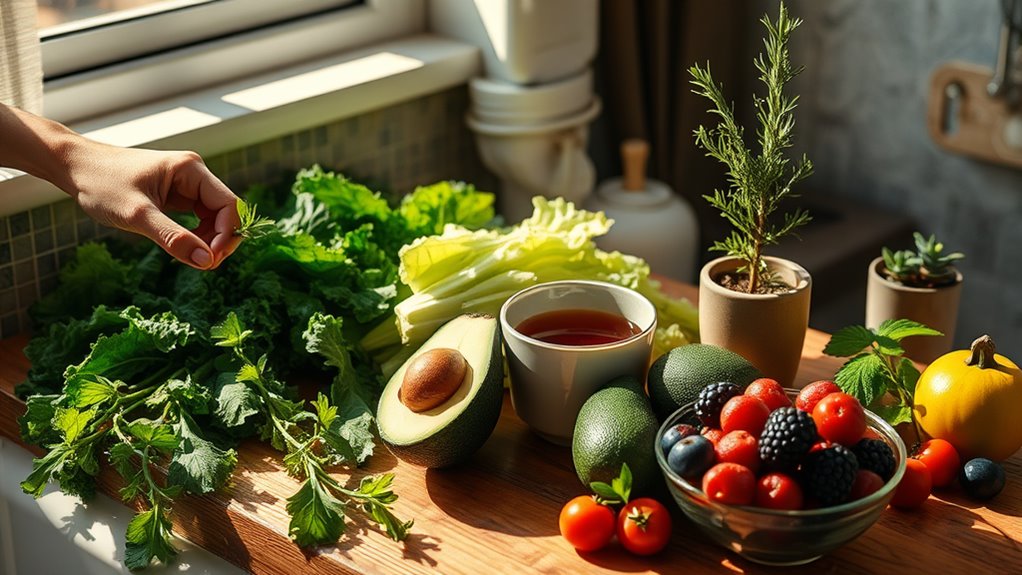7 Easy Natural Hacks to Manage Blood Pressure
Incorporate Heart-Healthy Foods Into Your Diet
To effectively manage your blood pressure, incorporating heart-healthy foods into your diet is essential. Focus on fruits, vegetables, whole grains, and lean proteins. These foods help maintain a healthy weight and lower blood pressure. Limit salt and saturated fats, as they can negatively impact your levels. Additionally, including foods rich in potassium and magnesium can further support healthy blood pressure levels.
Stay Hydrated for Optimal Blood Circulation
Eating heart-healthy foods lays a strong foundation for your overall well-being, but hydration also plays an essential role in managing blood pressure.
Drinking enough water helps your blood flow smoothly, ensuring nutrients reach your organs effectively. Aim for at least eight glasses a day to stay energized and support ideal circulation.
Engage in Regular Physical Activity
While managing blood pressure can feel overwhelming, engaging in regular physical activity simplifies the process and offers numerous benefits.
Just 30 minutes of moderate exercise most days can considerably lower your blood pressure. Activities like walking, cycling, or swimming not only strengthen your heart but also boost your mood and improve overall health.
Practice Stress-Relief Techniques
When stress creeps into your life, it can have a significant impact on your blood pressure.
To combat this, practice stress-relief techniques like deep breathing, meditation, or yoga. These activities help calm your mind and body, lowering your heart rate and promoting relaxation.
Find a technique that resonates with you, and make it a regular part of your routine for better blood pressure management.
Monitor Your Sodium Intake
To manage your blood pressure, it’s essential to monitor your sodium intake.
Start by understanding where sodium hides in your diet and make a habit of reading food labels.
You can also experiment with different seasonings to add flavor without extra salt.
Understand Sodium Sources
Understanding where sodium hides in your diet is essential for managing your blood pressure effectively.
Many processed foods, snacks, and restaurant meals are packed with hidden sodium. Condiments, canned goods, and even bread can contribute considerably to your intake.
Read Food Labels
Since reading food labels can seem intimidating at first, it’s essential to make it a habit if you want to manage your sodium intake effectively.
Start by checking the sodium content per serving and compare it with your daily limit. Look for hidden sources of sodium in processed foods, and choose options with lower sodium levels to support your heart health better.
Experiment With Seasoning
Finding ways to enhance the flavor of your meals without relying on salt can make a significant difference in managing your blood pressure.
Experiment with herbs, spices, lemon juice, and vinegar to add zest. Try garlic, paprika, or basil for a flavor boost.
You’ll discover that reducing sodium doesn’t mean sacrificing taste, and your dishes can be just as satisfying!
Get Quality Sleep Each Night
Getting quality sleep each night is essential for managing your blood pressure.
By establishing a consistent sleep schedule, creating a sleep-friendly environment, and limiting screen time before bed, you can greatly improve your rest.
Let’s explore how these simple changes can make a big difference in your overall health.
Establish a Sleep Schedule
While many factors influence blood pressure, establishing a consistent sleep schedule is one of the most effective ways to promote overall health.
Aim to go to bed and wake up at the same time each day, even on weekends. This routine helps regulate your body’s internal clock, improves sleep quality, and supports your heart health, ultimately helping you manage your blood pressure better.
Create a Sleep-Friendly Environment
Creating a sleep-friendly environment is crucial for achieving quality rest each night.
Keep your bedroom dark, quiet, and cool to promote relaxation. Use comfortable bedding and consider blackout curtains or a white noise machine to eliminate distractions.
Aromatherapy with calming scents like lavender can further enhance your space.
Limit Screen Time Before Bed
A peaceful sleep environment sets the stage for restful nights, but another key factor in achieving quality sleep is limiting screen time before bed.
The blue light emitted by devices can interfere with your body’s natural sleep-wake cycle. Try to switch off screens at least an hour before bedtime.
Instead, read a book or practice relaxation techniques to help you unwind.
Embrace Mindfulness and Relaxation Practices
When you incorporate mindfulness and relaxation practices into your daily routine, you can markedly lower your blood pressure and enhance your overall well-being.
Try techniques like deep breathing, meditation, or yoga. These practices help you manage stress and promote a calm mind.
Even just a few minutes each day can make a significant difference in your blood pressure levels and mental health.





